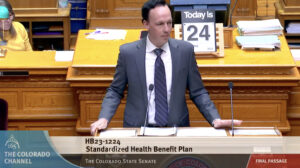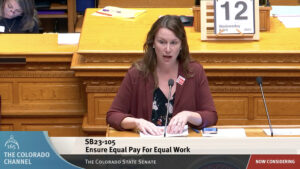Colorado Senate Majority Leader Robert Rodriguez announced changes Tuesday to committee structures and memberships that had been anticipated since his election to the position two months ago — changes that particularly could impact the fate of housing bills in 2024.
Rodriguez reduced or expanded the size of several committees – including the Business, Labor and Technology Committee – in ways that could make it easier for Democrats, who hold a 23-12 majority in the chamber, to pass bills to the floor or kill them before they reach that point. And he changed one or more Democratic members of several other committees after the resignation of former Senate Majority Leader Dominick Moreno brought a new member into the chamber and led to the elevation of Rodriguez, who no longer will sit on any committees.
Maybe the most impactful move is to the Senate Local Government and Housing Committee, which during the 2023 session killed bills to permit local rent-control laws and restrict how metro districts could issue debt and watered down a proposal to give local governments right of first refusal on apartment complexes that go up for sale. Polis later vetoed that ROFR bill, House Bill 1190, under pressure from construction and economic-development groups.
Sen. Dylan Roberts, D-Avon, was the deciding vote on killing and amending all those bills, and his moderate positions on those pieces of legislation generated criticism from liberal Democrats. On Tuesday, Rodriguez removed Roberts from the Local Government and Housing Committee, replacing him with Assistant Majority Leader Faith Winter, a more liberal Democrat from Broomfield who threw her support behind Rodriguez in his majority-leader race against Democratic Sen. Rachel Zenzinger of Arvada.

Colorado state Sen. Dylan Roberts speaks on the Senate floor in April about his bill to make changes to the Colorado Option insurance program.
Killed bills may get new life
With both the rent-control and right-of-first-refusal bills rumored to be coming back in some form in 2024, the removal of their primary majority-party critic from a committee comprised of four Democrats and three Republicans gives them a better chance of reaching the floor. With every chamber Republican having expressed opposition to the bills previously and needing to flip just six of the 23 Democrats to kill a bill, it remains unclear whether such ideas could get through the more moderate of the two chambers, but full debate seems likely.
The shakeup of that committee’s members also could impact a construction-defects reform bill that aims to boost production of condominiums by making it harder to file lawsuits against builders and that is expected to be introduced early in the session. While it’s possible that the bill could run through the Senate Judiciary Committee, it likely would face a harsher quartet of majority-party skeptics if it is assigned to the Local Government and Housing Committee.
Roberts, however, will keep his chairmanship of the Senate Agriculture and Natural Resources Committee, and he also maintains his key seat on the Senate Judiciary Committee, where Democrats continue to hold just a 3-2 seat advantage under the new assignments. Another moderate who has been a target of liberal criticism — Democratic Sen. Kyle Mullica of Federal Heights — also will maintain his chairmanship of the important Senate Finance Committee, which will keep its 4-3 party split as well under the new assignments.
Changes to committees’ composition
Rodriguez changed the structure of the business panel — known in the Capitol as the BLT committee — from having six Democrats and three Republicans to being comprised of five Ds and 2 Rs.

Colorado state Sen. Jessie Danielson speaks in April for her proposed update to the Equal Pay for Equal Work law.
While that doesn’t give Democrats a greater advantage — Republicans still must flip two members of the majority party to pass or kill a controversial bill — it does leave the committee with just one Democrat considered a consistent moderate, Sen. JoAnn Ginal of Fort Collins. And Rodriguez, who served this year as panel chairman, will be replaced in that role by Sen. Jessie Danielson of Wheat Ridge, one of the Capitol’s biggest advocates for labor and workers’ rights.
Rodriguez added two Democrats to the high-profile Senate Appropriations Committee — the panel that considers any bill that would require money be set aside in the state budget to fund it — growing the majority party’s advantage on it from 4-3 to 6-3.
A help to Polis’ affordable-housing efforts?
But while Republicans now would require two Democrats rather than one to join with them to pass or kill bills, such a scenario might be more likely there than on other committees. Zenzinger and Democratic Sen. Jeff Bridges of Greenwood Village — two committee members — are the caucus’ two appointees to the powerful Joint Budget Committee and, as such, often share similar views on bills that could affect the structure of the budget that the JBC puts together.
One bill that the change in Appropriations Committee structure could impact, however, is the potential return of a land-use reform bill that Gov. Jared Polis pushed unsuccessfully this past session to reduce local control over zoning decisions along key and transit-oriented corridors, with a goal to boost development of affordable housing. Zenzinger, a former Arvada City Council member, was able in the committee this year to remove all local-control overrides in the bill, but it’s unknown whether she could muster a second committee vote to do so in 2024 if a similar bill were to return.
The 2024 legislative session is scheduled to commence on Jan. 10 and last for 120 days.
“Our caucus members have been hard at work over the interim preparing to tackle the challenges that matter most to our communities and build on the progress we made last year,” Rodriguez said in a news release announcing the full Democratic makeup of committees. “I am excited for our members to dive into the issues, have informed and thoughtful deliberations, and create lasting results for the people of Colorado.”
